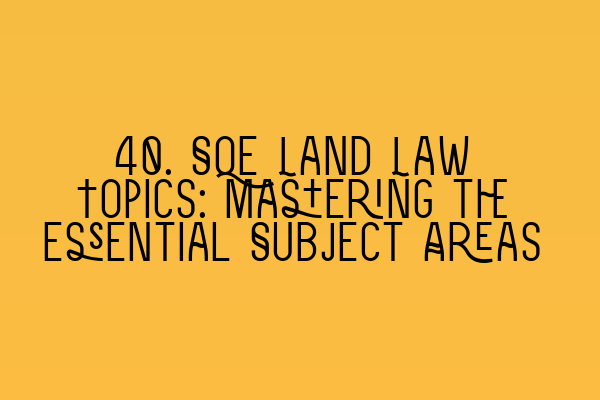40. SQE Land Law Topics: Mastering the Essential Subject Areas
Welcome to SQE Property Law & Land Law, the experts in property law education and preparation for the Solicitors Qualifying Examination (SQE). In today’s blog post, we will delve into the 40 essential SQE land law topics that every aspiring solicitor should master. Whether you’re preparing for your SQE exam or simply expanding your knowledge in this area of law, this comprehensive guide will provide you with the necessary information to excel.
1. Introduction to Land Law
Land law is a fundamental area of legal practice that deals with the rights and interests in land, as well as the relationships between individuals and their land. It covers a wide range of topics, including property ownership, leases, mortgages, easements, and more.
Understanding the basic principles of land law is crucial to becoming a successful property solicitor. It forms the foundation for more complex legal issues that may arise in practice.
2. Property Ownership
Property ownership refers to the legal rights and responsibilities associated with owning real estate. It is important to have a clear understanding of the different forms of property ownership, including freehold and leasehold, as well as co-ownership and joint tenancies.
For a detailed explanation and examples of property ownership, check out our article on SQE 1 Practice Exam Questions.
3. Leases and Tenancies
A lease is a contractual agreement between a landlord (lessor) and a tenant (lessee) that grants the tenant the right to occupy a property for a specified period of time. As a property solicitor, you will often deal with lease agreements and be responsible for advising clients on their rights and obligations.
To dive deeper into leases and tenancies, take a look at our comprehensive guide on SQE 1 Practice Mocks FLK1 FLK2.
4. Mortgages
Mortgages play a significant role in property transactions, allowing individuals to finance the purchase of real estate. As a property solicitor, you will need to understand the intricacies of mortgage law, including the rights and responsibilities of both the borrower and lender.
For a comprehensive overview of mortgages and their legal implications, check out our article on SQE 2 Preparation Courses.
5. Easements and Covenants
Easements and covenants are rights and restrictions that affect the use and enjoyment of land. They can have a significant impact on property transactions and require careful consideration. Understanding the legal framework surrounding easements and covenants is essential for any property solicitor.
If you want to delve further into easements and covenants, our article on SQE 1 Preparation Courses provides detailed explanations and case examples.
6. Land Registration
Land registration is the process of recording ownership and interests in land. The Land Registration Act 2002 introduced major reforms to the registration system in England and Wales. As a property solicitor, you will need to be familiar with the registration process and the implications it has on property transactions.
To stay up-to-date with the latest land registration procedures, visit our article on SRA SQE Exam Dates.
7. Adverse Possession
Adverse possession is a legal principle that allows a person to claim ownership of land that they have occupied and used without permission for a certain period of time. It is a complex area of land law that often involves historical and factual investigations.
For a comprehensive understanding of adverse possession and the requirements for a successful claim, consult our article on SQE 1 Practice Exam Questions.
8. Planning Law
Planning law governs the use and development of land. It involves obtaining planning permission for various development projects, compliance with planning regulations, and dealing with planning appeals and inquiries. As a property solicitor, you may be involved in advising clients on planning matters and representing them in planning disputes.
To enhance your knowledge of planning law, consider exploring our article on SQE 2 Preparation Courses.
9. Landlord and Tenant Law
Landlord and tenant law governs the relationship between landlords and tenants. It covers a wide range of issues, including rent, repairs, eviction, and termination of leases. Familiarizing yourself with the rights and obligations of both landlords and tenants is essential for any property solicitor.
If you’re interested in delving deeper into landlord and tenant law, our article on SQE 1 Preparation Courses provides valuable insights and case examples.
In Conclusion
Mastering the essential land law topics is crucial for any aspiring solicitor. By having a solid understanding of property ownership, leases, mortgages, easements, covenants, land registration, adverse possession, planning law, and landlord and tenant law, you will be better equipped to handle real-world scenarios and provide effective legal advice to your clients.
If you’re looking for comprehensive preparation materials for the SQE exam, including practice questions and mock exams, be sure to check out our related articles on SQE 1 Practice Exam Questions and SQE 1 Practice Mocks FLK1 FLK2.
If you’re ready to take your SQE preparation to the next level, explore our SQE 2 Preparation Courses and SQE 1 Preparation Courses to gain the knowledge and skills you need to succeed in your legal career.
Stay tuned for more informative blog posts from SQE Property Law & Land Law. Together, we can help you become a confident and accomplished property solicitor!
